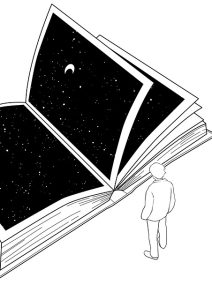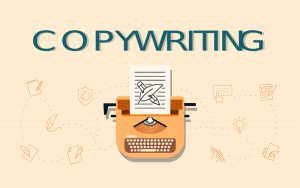Whatever you do, don’t quit, even if you sit there for hours for blood to form on your forehead before it spills on a page just so you can create a horror. You know what’s cool about being a writer in the 21st century? There is no need for weapons of mass oil spills, sorry ink spills such as pens, and old typewriters, everything happens like Star Wars these days… having a “laser jet,” is pretty cool.
So, which “type-writer” are you? If you’re a starter then just write, just keep writing to figure out which “type-writer” you are. It would change over time when you write several genres. Perhaps, you only wish to stick around particular playgrounds. If this is the case let’s go and identify which “type-writer” are you, potentially?
 1) Ghost-writer
1) Ghost-writer
A ghost-writer is a writer who writes anonymously for a politician, highly professional people, or someone who can’t write the story themselves due to their skillset or doesn’t have the time to write the story out, therefore, they’d hire a ghost-writer to write the novel or story for them. The ghost- writer will not get the credit for the content; however, they are just paid to write the story. A ghost-writer has to be good at writing stories convincingly and with high quality.
2) Blogger
A blogger uses technology and publishes short pieces of content or long format content that is factual. These can fall into the categories of food, entertainment, travel, business, technology, etc. A blogger looks for ways to promote their business or their niche. Bloggers are also hired for content in businesses to write on topics using digital tactics so that a business can become more visible on the world wide web. Blogging became popular in the 1990s.
3) Short story writer
The short story writer tells stories in a short time compared to novels and usually has a word count of 1000 to 10 000 or even 15 000, however, some stories can be told in 500 words too. It’s not set in stone; flash fiction is usually between 500 to 1000 words.
4) Copywriter
Copywriting usually falls under business requirements. A person is hired for writing for advertising and marketing. Today copywriters can work autonomously or fill a role for a company. Copywriters write for businesses intending to create awareness among consumers of problems and solutions with the sole purpose of getting engagement and preferably sales.
5) Creative writer
Which “type-writer” are you? Perhaps this one is your cup of tea. Creative writing examples can be The South African: True Colours and The South African: Roamer. Depending on what the author has in mind for the reader can take a bit of getting used to especially if the style of writing is different. In that way, some writers can be so futuristic that their writing might not go down so well until years later.
6) Satirist
Which “type-writer” are you? A satirist? It takes a lot of guts and genius to be a satirist. Examples of this are The Simpsons and South Park just to name a few. A satirist uses common prevalent subjects to make a point in society picking on stupidity, societal norms, politics or polarized topics by making them comical, exaggerated, or even sarcastic. The use of hyperbole is also common among satirists.
7) Technical writer
As a technical writer one has to adhere to a style guide due to the nature of this work. A technical writer writes manuals and guides. As a technical writer creativity is not necessary or needed. As a technical writer, the job is to help the reader understand the product or solution and how to use it. This sort of writing is usually straightforward, factual and without emotions. Technical writing can also be a guide to assembling things.
8) Business writer
This can fall under writing for magazines and newspapers for certain industries such as football, technology, automobiles, motorbikes or any niche where the author/writer knows the subject and terminology like the back of their hand. This niche area could be for a specialist writer that businesses are willing to pay for since the writer/author already has been operating in that niche for several years. Business writing over time becomes a fulfilling job with constant networking in the industry.
 9) Novelist
9) Novelist
It’s hard to say which “type-writer” are you at the beginning of the writing journey. Until published and writing various pieces of work one might come to find that they enjoy writing fiction and non-fiction stories of considerable length. The writing journey often makes the writer and not the writer in charge of their writing journey. No one ever knows which book will end up being the breakthrough or if the writer/author ends up choosing and enjoying another type of writing.
10) Journalist
Being a journalist requires a lot of research into the article that one will be writing, and it’s essential to get the story written otherwise the wrong people can be blown out of perspective, not only the story. Journalists represent the country and sometimes they have to come forth in writing brutal truths that the nation could be in complete shock from one moment to the next. Journalists often write with the style of persuasion.
 11) Playwright
11) Playwright
This author/writer writes plays for theatrical performance, remember Shakespeare? With such success, Shakespeare’s plays became set works in schools for the study of English literature around the world, and later became screenplays. One never knows how work can become notable and where it can lead to. These are usually written for acting.
“Witch ‘type-writer’ are you?”
12) Screenwriter
This is a writer who writes scripts or series for TV and movies. These can be based on books, stories, or any source. The screenplay is usually written for acting and verbal speech simultaneously just as in plays.
13) Poet
A poet writes small, short lines that follow poetical structures or not. The poet could simply write something that tells a story or a part of a story making it memorable perhaps by playing with the sound of words. The poet uses emotions and senses making the reader almost visualise while reading using poetical properties.
14) Songwriter
Songwriters write using sound making the words follow in a rhythm, and catchy to the audience using musical notes. The lyrics are often secondary to what appeals at first; the words are accompanied by the music or the playing around of words, sometimes meaningless or sometimes genius.
15) Review writing
Review writing has come about with the digital age along with being able to access and purchase items online. Today people search online before purchasing, to understand the quality of the item or experience such as restaurants, products, movies, or vacations, which they plan to visit or purchase tickets for in advance.
 16) Translator
16) Translator
Which “type-writer” are you? You might find that there are several parts of this article that makes you a versatile writer, and one area is here if you speak and write another language apart from your native language. Book translators are also required around the world. This can be a challenge especially when quotes and expressions differ from one language to the next.
The work of a translator can vary from business, personal, book translations even education credentials.
Which “type-writer” are you? This is a very in-depth subject as there are so many types of writers that one still doesn’t know that are out there such as:
17) Narrative writer
18) Expository writer
19) Persuasive writer
20) Objective writer
21) Subjective writer
22) Entertainment writer
In this article, different types of writing styles explain nicely the above 5 points.
Don’t miss this article, this is another interesting area for you to further look into which “type-writer” are you.
Hey ever wondered what’s the prisoner of Azkaban’s favourite punctuation mark.
… give up?
Okay, the answer is a period.
Ever wondered why?
…give up?
Because it marks the end of a sentence…
You can also have a look at the Which “type-writer” are you? short video.
Drop us a comment below and follow us or share this article on Instagram, Tiktok, Facebook.
In the next article, we will look at different types of publishers.
Yours sincerely,
T. Dench Patel











